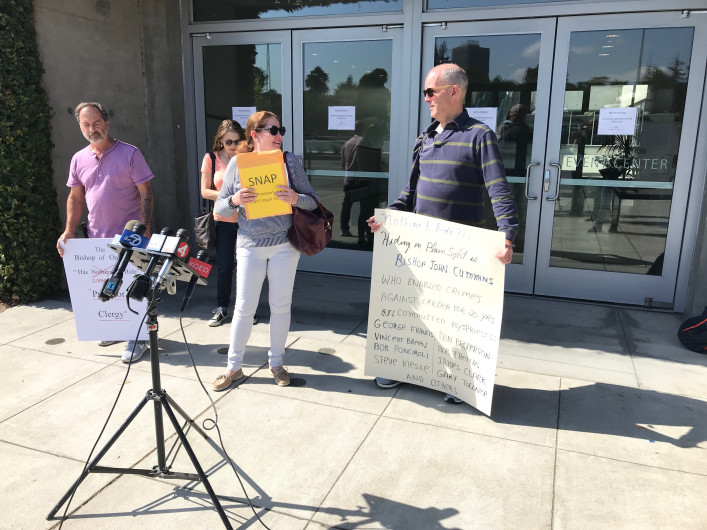Catholic Priest Scandal: New Lawsuits Use Nuisance and Racketeering Laws to Target Clergy Sex Abuse
By Tracey Kaplan
The ongoing scandal over sexual abuse by Catholic clergy has led to two new high-profile lawsuits, both aimed at forcing American bishops to divulge secret lists of offenders dating back more than six decades. But one of the legal attacks goes even further by pinning the blame on Vatican officials for misconduct in the United States, relying in part on a legal doctrine more commonly used to take down drug dealers and Mafia members. The other relies on nuisance laws, alleging that the church has created a public hazard. The lawsuits, both of which include victims from California and were filed in federal court this month, represent a far more sweeping approach than suing individual priests or a diocese as a way to expose clergy abuse and its alleged cover-up. This is not “Father so-and-so” abusing one child, said Mitchell A. Toups, of Texas, one of the lawyers in the suit that names the church government in the Vatican, known as the Holy See. “This is a much broader attack.” Judy Keane, a spokeswoman for the conference of bishops, said the group does not comment on pending litigation. The federal lawsuits come in the wake of a scathing Pennyslvania grand jury probe earlier this year, which found the church hierarchy there had protected more than 300 priests who had sexually abused at least 1,000 children over seven decades. Since that report was released in mid-August, 19 state attorneys general have opened sexual abuse investigations. The California Attorney General’s Office earlier this month began collecting information from the public about sexual misconduct by Catholic clergy in what is believed to be the first step to a full-blown investigation in this state. The wide-ranging class-action lawsuit that Toups and a group of law firms filed in Washington D.C. alleges several causes of action, including negligence. More notably, it accuses the Conference of Bishops and the Holy See of violating the Racketeer Influenced and Corrupt Organizations Act, a federal law designed to combat organized crime in the United States. According to the suit, the church has operated like a criminal enterprise, first by subjecting children and others to clergy sexual abuse, then by covering it up in violation of laws requiring officials to report suspected abuse to law enforcement. The suit alleges the church does so to maintain and expand its “commercial operations,” including money and real estate. It claims the church carries out its schemes to defraud victims “out of their childhood, youth, innocence, virginity, families, jobs, finances, assets — in short their lives” through interstate and international telephone calls and electronic communications in violation of federal law. “I can’t think of another criminal syndicate that has destroyed as many lives as the church,” said one of the named plaintiffs in the lawsuit, Joey Piscitelli, a Northern California leader for the Survivors Network of those Abused by Priests or SNAP. He was repeatedly abused when he was in high school in Richmond in 1969-70 and won a civil lawsuit in 2006 against the Rev. Steve Whelan, in which Whelan was found liable for rape. Piscitelli was awarded $600,000. The suit also takes the unusual step of invoking the “command responsibility” doctrine, which until now has been applied only to the military to hold superiors liable for subordinates’ conduct, Toups said. He is seeking unspecified monetary damages, which would be tripled under the RICO Act, and the creation of a court-supervised medical monitoring program funded by the church to provide psychological treatment to victims. The other federal lawsuit was filed by lawyer Jeff Anderson in Minnesota against the U.S. Conference of Catholic Bishops under the “maintenance of a public hazard” or nuisance doctrine. Anderson said nuisance laws are typically used to force a property owner to clean up problems like a polluted river. But the lawyer, who has sued thousands of Catholic priests, dioceses and bishops over the past 35 years, alleges that the bishops’ strict adherence to secrecy and avoidance of scandal creates a public hazard. A similar lawsuit that he filed against the archdiocese in the Twin Cities triggered an investigation by a top county prosecutor and a $210 million settlement for 450 victims. Of the 197 dioceses in the United States, 61 percent have not released any clergy abuse accusation lists, Anderson said. San Jose recently became the first Bay Area diocese to reveal the names of priests credibly accused of abuse in an effort to renew the trust of parishioners. Critics have said the list is incomplete. Oakland has promised to release a similar list soon, and the Archdiocese of San Francisco is still considering its next step. There is no guarantee either lawsuit will succeed. Among other challenges, the lawyers in the RICO suit must translate their 77-page civil action into Latin, the official language of the Holy See. In addition, the Holy See is a sovereign state with its own laws. However, New Jersey lawyer Stephen Rubino in 1993 won a seven-figure settlement after suing the diocese in Camden under the RICO act. Rubino said the time may be ripe for more such actions. “Now, everybody has a sense of the gravity and scope of the sexual abuse problem.” Rubino said.
|
.
Any original material on these pages is copyright © BishopAccountability.org 2004. Reproduce freely with attribution.
